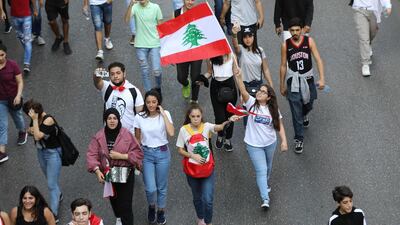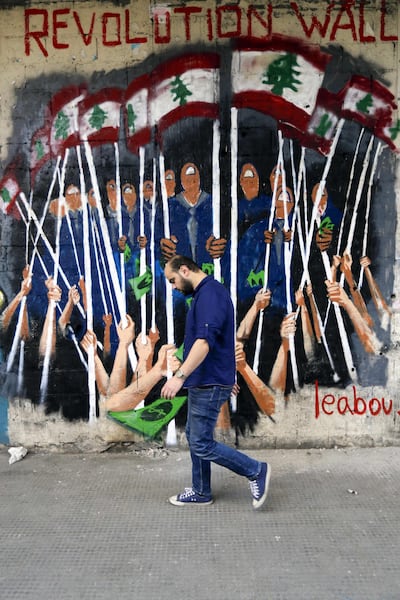Lebanon’s revolution shows no sign of abating but in the coming phase this will not matter, because the indifference of the ruling class and the coming economic collapse is leading to a dangerous new phase. The perseverance and multi-generational aspect of the Lebanese revolution have left the politicians in shock, after they assumed the protests were a fleeting emotional outburst that would inevitably fizzle out.
Despite their shock, they continue to bet on the uprising running out of steam, prompting protesters to go home, after which everything would return to normal – that is to say, corrupt politicians will return to their misdemeanours and their domination of the country’s resources and fate. However, the multi-generational revolution has created a new reality, despite the ruling class’s refusal to recognise it. The era of impunity and blind obedience is over. But the denial does not mean these men of power and sectarianism are not panicking. The coming social unrest will lead to mob hysteria against them and those close to them. If and when economic collapse happens, it will lead to shortages in fuel, food and other basic commodities in the next two months, precipitating a financial and social catastrophe. The young faces of the revolution must take all necessary measures to avoid descending into a mob mentality of wanton destruction.
The failure of the ruling class to understand the consequences of their deception, arrogance and greed, thinking that they can stall until the revolution has run its course, is dangerous and foolish, because it is not the youth who will tire first but the old men of the regime in Lebanon. President Michel Aoun’s delay in designating a prime minister to form a government to embark on serious, technocratic solutions to save Lebanon from total collapse could be a fateful gamble. Indeed, it could mean that he will be the person to blame if Lebanon descends into chaos.
Meanwhile, the Iranian leadership appears to be extremely panicked by the prospect of an internal eruption and an uprising against the regime, encouraged by the protests in Lebanon and Iraq. According to sources, Iran could be considering an escalation to divert attention away from what is happen domestically. Targeting tankers and other vital installations in the Gulf remains a possibility. In Lebanon, Iran is making frantic calculations, since Hezbollah is a precious card. The Iranians are keen to keep Lebanon under the yoke by ensuring Hezbollah dominates any government in Lebanon. Important decisions could be made in this regard, following a meeting of the Iranian leadership on Monday, decisions that could include extinguishing the Lebanese revolution at any cost.
Iran's leadership has so far decided to treat the Lebanese uprising as something that targets corruption primarily rather than Hezbollah. This line of thinking is convenient for Tehran for now. But the question remains in the mind of Iran’s leaders: what kind of stability can be restored in Lebanon and where would that leave Hezbollah?
Iran’s clear priority is that Hezbollah must step up its domination over Lebanon. The regime could resort to major escalation abroad to mask its failure, which has led to an economic crisis, isolation and sanctions. Leaders are currently in the process of ramping up Iran’s nuclear capabilities to provoke counter actions and rally nationalist support for their regime.
However, the sphere of influence that the Islamic Revolutionary Guard Corps boasts of commanding is no longer working. Iraq has entered a cycle of chaos which no political force, internal or external, can rein in. This cannot be reassuring for the IRGC, which once thought Iraq’s Popular Mobilisation Forces were its trump card in Iraq. What we are witnessing is a major blow to Iran’s regional expansionist project. Its leadership is studying frantically what its options are in Iraq and Lebanon to safeguard the PMF and Hezbollah from the Iraqi and Lebanese uprisings.
Hezbollah will continue to feel reassured as long as protesters do not demand that it disarms and hands over weapons supplied by Iran. The group is betting on the fidelity of the president and his son-in-law Gebran Bassil, and the alliance with their Free Patriotic Movement, to share power and control over Lebanon and its resources. So far, this alliance has resisted the formation of a technocratic government independent of political, ideological, partisan or sectarian dictats. It is still imagining the uprising will be quenched but this is delusional.
If Hezbollah comes to the conclusion that the revolution threatens its privileges, it has the arms to force a qualitative change in its trajectory and turn it from a protest movement into a civil war. For this reason, Hezbollah leads the camp rejecting the movement's main demands.
If the decision to prevent the formation of such a government continues, Lebanon is on its way to the abyss. The protest movement must therefore hold onto the priority of installing a government of technocrats, then gradually demand other issues in parallel with efforts to prosecute the corrupt and restore looted public funds. Without a clean, independent government, no funds will come to Lebanon to rescue its economy from collapse. There would be no prospects either for new electoral laws or radical reforms.
What is coming will be very difficult. Hospital staff are already voicing alarm. The coming phase will chime with the pain of the people, who will no doubt blame the political class but could also blame demonstrators if they fail to develop achievable goals.
The time has come for international governments and institutions to pressure Lebanon’s leaders to stop stalling immediately, or they will be blamed for letting the country spiral into chaos.
The revolution, for its part, must be conscious of the necessity of preserving the state and its institutions. If the country descends into mass riots, the army has a responsibility to distinguish between civil rights activists and rioters. This is a dangerous and delicate phase but it will decide the fate of Lebanon.



